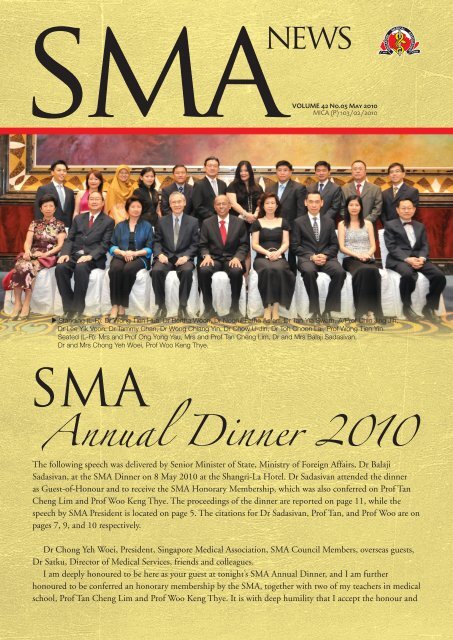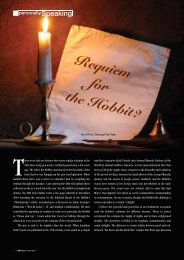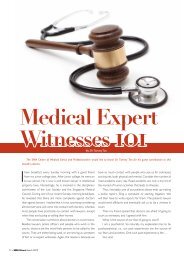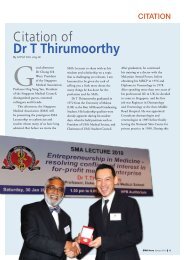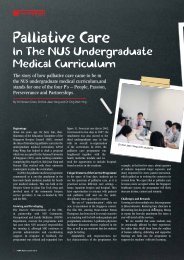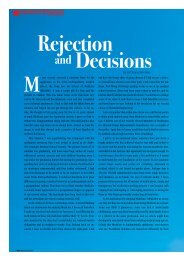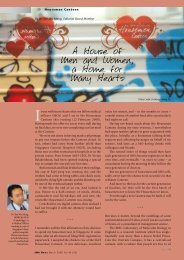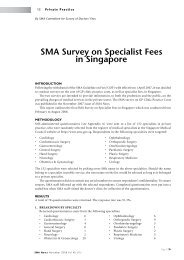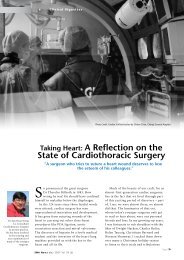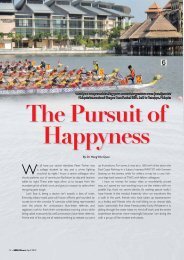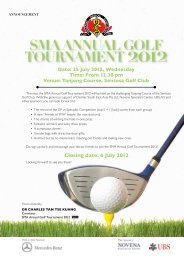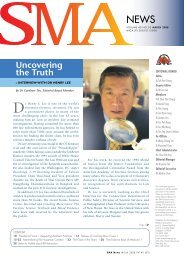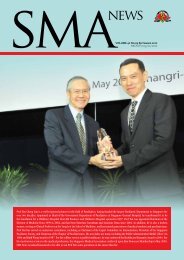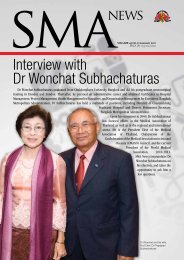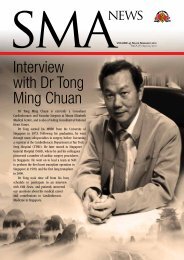Annual Dinner 2010 - SMA News - Singapore Medical Association
Annual Dinner 2010 - SMA News - Singapore Medical Association
Annual Dinner 2010 - SMA News - Singapore Medical Association
You also want an ePaper? Increase the reach of your titles
YUMPU automatically turns print PDFs into web optimized ePapers that Google loves.
VOLUME 42 No.05 May <strong>2010</strong><br />
MICA (P) 103/02/<strong>2010</strong><br />
Standing (L-R): Dr Wong Tien Hua, Dr Bertha Woon, Dr Noorul Fatha As’art, Dr Tan Yia Swam, A/Prof Chin Jing Jih,<br />
Dr Lee Yik Voon, Dr Tammy Chan, Dr Wong Chiang Yin, Dr Chow U-Jin, Dr Toh Choon Lai, Prof Wong Tien Yin.<br />
Seated (L-R): Mrs and Prof Ong Yong Yau, Mrs and Prof Tan Cheng Lim, Dr and Mrs Balaji Sadasivan,<br />
Dr and Mrs Chong Yeh Woei, Prof Woo Keng Thye.<br />
<strong>SMA</strong><br />
<strong>Annual</strong> <strong>Dinner</strong> <strong>2010</strong><br />
The following speech was delivered by Senior Minister of State, Ministry of Foreign Affairs, Dr Balaji<br />
Sadasivan, at the <strong>SMA</strong> <strong>Dinner</strong> on 8 May <strong>2010</strong> at the Shangri-La Hotel. Dr Sadasivan attended the dinner<br />
as Guest-of-Honour and to receive the <strong>SMA</strong> Honorary Membership, which was also conferred on Prof Tan<br />
Cheng Lim and Prof Woo Keng Thye. The proceedings of the dinner are reported on page 11, while the<br />
speech by <strong>SMA</strong> President is located on page 5. The citations for Dr Sadasivan, Prof Tan, and Prof Woo are on<br />
pages 7, 9, and 10 respectively.<br />
Dr Chong Yeh Woei, President, <strong>Singapore</strong> <strong>Medical</strong> <strong>Association</strong>, <strong>SMA</strong> Council Members, overseas guests,<br />
Dr Satku, Director of <strong>Medical</strong> Services, friends and colleagues.<br />
I am deeply honoured to be here as your guest at tonight’s <strong>SMA</strong> <strong>Annual</strong> <strong>Dinner</strong>, and I am further<br />
honoured to be conferred an honorary membership by the <strong>SMA</strong>, together with two of my teachers in medical<br />
school, Prof Tan Cheng Lim and Prof Woo Keng Thye. It is with deep humility that I accept the honour and
V O L U M E 4 2<br />
N O . 0 5 M AY 2 0 1 0<br />
EDITORIAL BOARD<br />
EDITOR<br />
Dr Toh Han Chong<br />
DEPUTY EDITOR<br />
Dr Tan Yia Swam<br />
MEMBERS<br />
Prof Chee Yam Cheng<br />
Dr Martin Chio<br />
A/Prof Daniel Fung<br />
Dr Hsu Liyang<br />
Dr Jayant V Iyer<br />
Dr Lim Boon Leng<br />
Dr Jeremy Lim<br />
Dr Tan Poh Kiang<br />
Dr Tan Wu Meng<br />
Dr Teo Eng Swee Cuthbert<br />
EX-OFFICIOS<br />
Dr Chong Yeh Woei<br />
Dr Abdul Razakjr Omar<br />
EDITORIAL MANAGER<br />
Ms Krysania Tan<br />
EDITORIAL EXECUTIVE<br />
Ms Gracia Ong<br />
The views and opinions expressed in all the articles<br />
are those of the authors. These are not the views<br />
of the Editorial Board nor the <strong>SMA</strong> Council unless<br />
specifically stated so in writing. The contents of<br />
the <strong>News</strong>letter are not to be printed in whole or in<br />
part without prior written approval of the Editor.<br />
Published by the<br />
<strong>Singapore</strong> <strong>Medical</strong> <strong>Association</strong>,<br />
Level 2, Alumni Medial Centre,<br />
2 College Road, <strong>Singapore</strong> 169850<br />
Tel: 6223 1264<br />
Fax: 6224 7827<br />
Email: news@sma.org.sg<br />
URL: http://www.sma.org.sg<br />
<strong>SMA</strong> Reg. No.: ROS 198/59 TAP<br />
For classified advertisements and<br />
professional announcements, please contact <strong>SMA</strong>.<br />
I accept it with a sense of appreciation<br />
of the many people who taught and<br />
mentored me in my journey through this<br />
great and wonderful profession.<br />
When I graduated from medical<br />
school 31 years ago, I had acquired the<br />
theoretical knowledge required to start a<br />
career in medicine. But as for the true art<br />
of doctoring, this I acquired much later<br />
at the bedside of patients from doctors<br />
more senior and experienced than me.<br />
Many of these doctors often talked about<br />
the great doctors who had mentored<br />
them; great doctors who influenced and<br />
moulded their minds, like Prof Gordon<br />
Ransome, Prof Seah Cheng Siang and<br />
Prof Wong Hock Boon. During my time<br />
as a young doctor, I was fortunate to have<br />
mentors who taught me what being a<br />
doctor meant. I had many mentors but<br />
tonight, I want to mention three of them<br />
and what I learnt from them.<br />
The first person is Dr Tham Cheok<br />
Fai. He established the discipline of<br />
neurosurgery in <strong>Singapore</strong> at Tan<br />
Tock Seng Hospital. In those days,<br />
neurosurgery was carried out without<br />
the benefit of CAT scans or MRI and<br />
the surgical mortality rates were high.<br />
Routine operations used to take more<br />
than 12-hours. You needed a strong<br />
constitution mentally and physically<br />
to do neurosurgery. Dr Tham had a<br />
fearsome reputation and many junior<br />
doctors kept their distance, but for those<br />
of us who worked for him, we quickly<br />
found that he was one of the most decent<br />
persons you could find. He was dedicated<br />
to his patients and would often spend<br />
more than an hour taking the consent<br />
for an operation, patiently explaining the<br />
procedure and answering all the patient’s<br />
questions.<br />
One day, I was doing ward rounds<br />
with him and we came to a young boy<br />
with a craniofacial deformity. He turned<br />
to me and he said: “There will be some<br />
doctors who will want to get publicity<br />
through this child because his head is<br />
misshapen. They will have seemingly<br />
good reasons for doing so – such as the<br />
publicity will profile the hospital, or<br />
they will claim it will help educate the<br />
public. You should never succumb to<br />
Feature<br />
this temptation. Behind the misshapen<br />
head is a human being whose dignity<br />
should be protected. They should not<br />
be portrayed as freaks. You should never<br />
forget that.” I never forgot what Dr<br />
Tham said. In my time at the Ministry<br />
of Health, I intervened several times to<br />
protect the human dignity of children<br />
and to prevent their exploitation.<br />
Dr Tham and Dr Baratham helped<br />
arrange my residency training at the<br />
Henry Ford Hospital in Michigan where<br />
I was mentored by Dr James Ausman,<br />
one of the most famous neurosurgeons<br />
in the US. As a surgical trainee, I was<br />
always interested in learning how to do<br />
my surgery better. The general strategy to<br />
try and improve your surgical skills was<br />
to identify the surgeon who was reputed<br />
to be the best in that type of surgery and<br />
assist him so that you could copy his<br />
method and hopefully you would have<br />
the same result that he has. The emphasis<br />
was on “how”.<br />
Dr Ausman taught me that surgery<br />
was a science. The question you should<br />
always ask is not “how” but “why”. Why<br />
should you use a surgical instrument in a<br />
particular way? Why should the head be<br />
positioned in a particular manner? Why<br />
should your incision be where it is and<br />
so on? Once you understand the science<br />
behind good surgical technique, you can<br />
do good surgery consistently. This means<br />
that most young doctors can be taught to<br />
become good surgeons if the teaching of<br />
surgical technique is taught as a science.<br />
Having learnt surgery as a science, years<br />
later, I found it enjoyable and easy to<br />
teach my trainees how to operate.<br />
Some surgeons like to publish their<br />
results, usually trying to show how their<br />
results are superior to their colleagues. I<br />
learnt that unless a surgeon can explain<br />
on a scientific basis why the outcome<br />
of his patients is better than others, the<br />
publication of his results is of no value<br />
to others. But if a surgeon could explain<br />
why his results were better, then others<br />
could follow him and achieve similar<br />
results. Such a surgeon would truly be<br />
a great doctor. Dr Ausman was such a<br />
surgeon and he was a great doctor. Many<br />
learnt from him how to do better surgery<br />
<strong>SMA</strong> <strong>News</strong> may <strong>2010</strong> |
Feature<br />
<strong>Medical</strong> school lectures and examinations cannot transmit the art<br />
of being a doctor. Neither can legislation. It is through mentoring,<br />
the teaching of lessons by the bedside when dealing with real<br />
patients with real problems that the wisdom of our profession is<br />
transmitted from one generation to the next.<br />
by understanding the science behind it.<br />
In the same manner, Dr Ausman<br />
taught us, his residents, to use a scientific<br />
approach to evaluate claims made by<br />
doctors, pharmauceutical companies and<br />
equipment manufacturers.<br />
The practice of medicine is a science.<br />
But it has always had to contend with<br />
charlatans. In the past, we competed<br />
with the snake oil salesmen. Today, to<br />
make matters more difficult, sometimes<br />
doctors themselves abandon science and<br />
become charlatans. So our profession<br />
has to contend with more sophisticated<br />
salesmen hawking mesotherapy, stem<br />
cell cure-alls and other similar unproven<br />
treatments.<br />
After finishing my residency, I<br />
became a fellow at Harvard and worked<br />
under Dr Peter Black, who was my<br />
mentor at the Brigham Hospital. Dr<br />
Black had a PhD in ethics and was a<br />
great teacher of ethics. I had expected<br />
patients to line up to be treated at<br />
Brigham because of its Harvard<br />
affiliation and reputation. Instead,<br />
the medical environment in Boston<br />
was highly competitive with multiple<br />
famous hospitals like the Brigham, the<br />
Massachusetts General Hospital and Beth<br />
Israel Hospital competing fiercely with<br />
each other for patients. All the hospitals<br />
were run like our private sector hospitals.<br />
The competition made them highly<br />
efficient and patient-centric. Yet I found<br />
that despite the commercial pressure,<br />
patients were not subject to unnecessary<br />
investigations or operations.<br />
The modern hospital environment<br />
is complicated with the hospital and its<br />
doctors having a tremendous advantage<br />
in their dealings with their customers, the<br />
patients. This is due to the asymmetry<br />
of information with the hospital having<br />
almost a monopoly of it and the patient<br />
| <strong>SMA</strong> <strong>News</strong> may <strong>2010</strong><br />
barely understanding half of what he is<br />
told. How was the patient protected from<br />
commercial pressures, which may not<br />
be in his interest? What were the checks<br />
and balances that kept the hospital<br />
honest in its dealings with patients?<br />
The answer in Boston was the doctorpatient<br />
relationship. Every patient had<br />
a doctor who was ultimately responsible<br />
for ensuring that the patient received the<br />
appropriate care. The doctor had a duty<br />
of care to the patient to ensure this, and<br />
this duty of care was more important<br />
than his obligations as an employee of<br />
the hospital. And Boston had enough<br />
lawyers to ensure that the doctors did not<br />
forget this duty of care.<br />
Even as our public hospitals promote<br />
the virtue of team work and its benefits<br />
in bringing efficiency to clinical care, it<br />
should never displace the doctor-patient<br />
relationship which ensures that every<br />
patient has a doctor and that the doctor<br />
is professionally and medico-legally<br />
responsible for ensuring that the patient<br />
receives the appropriate care.<br />
The great physician, William Osler<br />
understood the importance of mentoring<br />
and wrote:<br />
“Medicine is learned by the bedside<br />
and not in the classroom” and that “The<br />
practice of medicine is an art, not a trade;<br />
a calling, not a business; a calling in<br />
which your heart will be exercised equally<br />
with your head.”<br />
We have benefited from our seniors<br />
who mentored us at the bedside. I know<br />
that many of you are now considered<br />
seniors and are mentoring the next<br />
generation. In time, the next generation<br />
will become senior and they will mentor<br />
younger doctors. <strong>Medical</strong> school lectures<br />
and examinations cannot transmit the art<br />
of being a doctor. Neither can legislation.<br />
It is through mentoring, the teaching of<br />
lessons by the bedside when dealing with<br />
real patients with real problems that the<br />
wisdom of our profession is transmitted<br />
from one generation to the next. It has<br />
been so in the past and I think it will<br />
continue to be so in the future.<br />
Sometimes, when I meet up with my<br />
medical colleagues, some of them lament<br />
about our present circumstance and its<br />
imperfections, and wish for a simpler<br />
age from the past or some future utopian<br />
time when the world is more perfect. The<br />
truth is the practice of medicine would<br />
require no great wisdom in a perfect<br />
world. But the world has always been<br />
imperfect. This we have to accept. What<br />
changes with time are the imperfections<br />
that we have to tackle.<br />
Fifty years ago, <strong>Singapore</strong> was a poor<br />
country and doctors would have faced<br />
the problem of managing patients who<br />
did not have the means to purchase their<br />
treatment. How do you economise on<br />
treatment without affecting outcome?<br />
Today, in a more affluent <strong>Singapore</strong>, the<br />
challenge may be one where we have<br />
to resist the pressure from the hospital<br />
administration to maximise revenue from<br />
every patient.<br />
Whatever challenges an imperfect<br />
world presents our profession, the<br />
answers can be found by going back to<br />
the basics of good doctoring: Medicine<br />
is a science with no room for charlatans.<br />
Our duty of care is to the patient<br />
and the patient’s interest and well-being<br />
are paramount.<br />
Every patient should be treated<br />
with dignity.<br />
Thank you.


